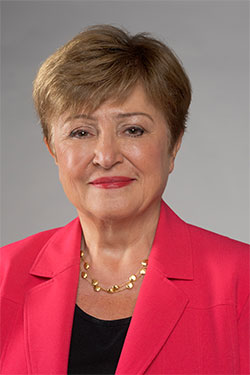IMF Chief Urges Global Cooperation for a More Resilient World Economy
Kristalina Georgieva, Managing Director of the International Monetary Fund (IMF), today delivered a powerful call for renewed international cooperation, urging countries to focus on building “a better balanced and more resilient world economy” amid rising trade tensions, market volatility, and mounting public debt.
Speaking ahead of the IMF’s Spring Meetings, Georgieva painted a stark picture of the current global economic landscape, marked by surging tariffs, distorted trade systems, and economic uncertainty. “Trade policy uncertainty is literally off the charts,” she said, referring to new IMF figures that highlight dramatic shifts in global tariff and subsidy measures.
Georgieva attributed the growing economic instability to eroding trust in the international system and the reemergence of protectionism, fueled by national security concerns and political divisions. She warned that while trade disruptions may bring temporary local benefits, they ultimately inflict long-term costs, especially on smaller and low-income economies.
“Uncertainty is costly,” Georgieva emphasized. She explained that unpredictable tariffs and supply chain disruptions are delaying investment, shaking financial markets, and driving up precautionary savings. Higher trade barriers are already dampening global growth and productivity.
IMF data reveals that despite past convergence, effective U.S. tariffs have now surged to historic highs, prompting retaliatory moves by other nations. “Everyone suffers if financial conditions worsen,” she warned, pointing to recent unusual movements in bond and currency markets.
Despite these challenges, Georgieva outlined a hopeful roadmap. She encouraged countries to prioritize domestic reforms, strengthen fiscal discipline, preserve central bank independence, and support private sector innovation. Low-income countries, she said, need stronger international support to manage tighter budgets and mobilize domestic resources.
The IMF is currently supporting 48 countries with balance-of-payments assistance, including Argentina, and will release new economic projections next week. While the global outlook includes growth markdowns, Georgieva said a recession is not forecasted.
Highlighting macroeconomic imbalances, Georgieva stressed the need for internal reforms and structural adjustments. She pointed to China’s need to boost private consumption, the EU’s requirement for deeper integration, and the U.S.’s urgent challenge to reduce federal debt. “Reforms and rebalancing are for everyone,” she said.
The IMF will soon publish a debt restructuring playbook under the Global Sovereign Debt Roundtable to help struggling countries manage unsustainable debt burdens.
In closing, Georgieva underscored the importance of cooperation in a multi-polar world. “We need a more resilient world economy, not a drift to division,” she said. She called for fairer trade policies, reduced distortions, and social protections for those most affected by global transitions.
“With cool heads, clear vision, and strong will, times of change can be times of renewal,” Georgieva concluded. “The secret to seizing the moment is to focus not on preserving the old, but on building the new.”
The IMF’s Spring Meetings, scheduled for next week, will bring together representatives from 191 member countries to chart the way forward.



